-
ORIGINAL ARTICLE12-16-2024
Editorial discourses in the history of Acta Paulista de Enfermagem (1988-2017)
Revista Brasileira de Enfermagem. 2024;77(6):e20230362
Abstract
ORIGINAL ARTICLEEditorial discourses in the history of Acta Paulista de Enfermagem (1988-2017)
Revista Brasileira de Enfermagem. 2024;77(6):e20230362
DOI 10.1590/0034-7167-2023-0362
Views0See moreABSTRACT
Objectives:
to analyze the editorial discourses of Acta Paulista de Enfermagem from 1988 to 2017.
Methods:
qualitative, historical, oral research, with interviews with the journal’s editors. Statements were categorized and presented in three decades, discussed from Foucault’s archaeological perspective.
Results:
seven statements presented three discourses. In the first decade, the discourse of knowledge registration and circulation presented statements of graduate studies and professional recognition. In the second decade, knowledge internationalization was added, with statements of business and editorial panopticism, selection criteria, indexing and digitalization. Finally, the discourse of shifting scientific assessment centrality was added with statements of preprint, open science, exclusive digitalization and mediatization of science.
Final Considerations:
the journal needed to adapt to form its official discourse, which made it possible, over the years, to change its initial peripheral position to a central one within scientific communication, supporting its panoptic role.
-
REVIEW12-16-2024
Strategies for expanding vaccination coverage in children in Brazil: systematic literature review
Revista Brasileira de Enfermagem. 2024;77(6):e20230343
Abstract
REVIEWStrategies for expanding vaccination coverage in children in Brazil: systematic literature review
Revista Brasileira de Enfermagem. 2024;77(6):e20230343
DOI 10.1590/0034-7167-2023-0343
Views1See moreABSTRACT
Objectives:
to identify the strategies found in the literature for increasing vaccination coverage among children in Brazil. It is justified mainly by the current scenario of falling vaccination coverage.
Methods:
systematic literature review. The search was carried out in the Pubmed (MEDLINE), Embase and Scopus databases, following the PRISMA guidelines.
Results:
initially, 4,824 results were returned. In the end, 6 studies were included for narrative synthesis using the SWiM methodology. Of these, 50% dealt with studies related to the Bolsa Família Program (PBF). The others explored strategies for approaching parents directly, Rapid Vaccination Monitoring (MRV) and the Community Health Agents Program (PACS). The PBF did not guarantee compliance with the conditionality of keeping vaccinations up to date. The MRV and PACS are effective strategies, especially because they allow active search for absentees.
Conclusions:
we conclude that more publications are needed on strategies to increase vaccination coverage among children in Brazil.

-
ORIGINAL ARTICLE12-16-2024
Educational technology to empower patients as participants in their care
Revista Brasileira de Enfermagem. 2024;77(6):e20230359
Abstract
ORIGINAL ARTICLEEducational technology to empower patients as participants in their care
Revista Brasileira de Enfermagem. 2024;77(6):e20230359
DOI 10.1590/0034-7167-2023-0359
Views0See moreABSTRACT
Objectives:
to build and validate an educational technology to empower patients as participants in their own care.
Methods:
methodological study to develop an educational technology based on the elaboration, validation, and evaluation that were carried out in five stages at a teaching hospital in Amazonas. The study was carried out from 2019 to 2022, with the participation of 19 judges specialized in patient safety and 72 patients admitted to the hospital’s medical and surgical clinics, the study setting.
Results:
the agreement between the judges obtained an overall index of 0.85, being considered validated. The overall analysis of the booklet obtained an assessment of the level of agreement above 85%.
Final Considerations:
the educational technology presented here was validated and suitable for promoting patient/professional rapprochement and consolidating health care in a way that increases the patient’s ability to contribute to their treatment and prevent the occurrence of adverse events.

-
ORIGINAL ARTICLE12-13-2024
Educational booklet on labor and delivery: validity study
Revista Brasileira de Enfermagem. 2024;77(5):e20240138
Abstract
ORIGINAL ARTICLEEducational booklet on labor and delivery: validity study
Revista Brasileira de Enfermagem. 2024;77(5):e20240138
DOI 10.1590/0034-7167-2024-0138
Views2See moreABSTRACT
Objectives:
to develop and validate an educational booklet on labor and delivery for pregnant women.
Methods:
this methodological study involved constructing and validating a booklet based on Echer’s framework. We used the Content Validity Index and Cronbach’s alpha for content and face validation, selecting judges according to Fering’s criteria. We then conducted a clinical validation with the target population.
Results:
the booklet, developed based on evidence from an integrative review and validated by judges and the target audience, achieved global Content Validity Index of 0.919 and 0.913, respectively. After clinical validation with 22 pregnant women, it included 28 topics and 48 pages, with illustrations by a graphic designer.
Conclusions:
expert judges and the target audience considered this educational technology valid, deeming it a relevant tool for promoting the health of pregnant women.

-
ORIGINAL ARTICLE12-13-2024
Interobserver agreement in Reception and Risk Stratification in Obstetrics implementation
Revista Brasileira de Enfermagem. 2024;77(5):e20230361
Abstract
ORIGINAL ARTICLEInterobserver agreement in Reception and Risk Stratification in Obstetrics implementation
Revista Brasileira de Enfermagem. 2024;77(5):e20230361
DOI 10.1590/0034-7167-2023-0361
Views0See moreABSTRACT
Objectives:
to analyze interobserver agreement in the Reception and Risk Stratification in Obstetrics protocol implementation.
Methods:
a cross-sectional study carried out during Reception and Risk Stratification in Obstetrics implementation, conducted in a tertiary hospital in southern Brazil with 891 participants in January 2020. Descriptive and interobserver agreement analysis was carried out using the Kappa coefficient in the risk stratification assigned by the triage nurse and reviewed by the researcher.
Results:
around half of the calls (55.6%) were stratified as not very urgent (green), followed by urgent (yellow) (31.8%), very urgent (orange) (9.3%), not urgent (blue) (3.4%) and no emerging stratification (red). Agreement analysis of revised stratification found Kappa values of 0.20 (blue), 0.54 (green), 0.77 (yellow) and 0.80 (orange).
Conclusions:
most appointments were non-urgent. The agreement analysis between the revised and assigned risk stratification revealed greater interobserver agreement as the priority level increased.
-
12-13-2024
Training of Brazilian indigenous nurses: between human rights, valuing diversity and inclusion
Revista Brasileira de Enfermagem. 2024;77(5):e20230430
Abstract
Training of Brazilian indigenous nurses: between human rights, valuing diversity and inclusion
Revista Brasileira de Enfermagem. 2024;77(5):e20230430
DOI 10.1590/0034-7167-2023-0430
Views0See moreABSTRACT
Objectives:
to analyze the possibilities and potential of training indigenous nurses, given the Brazilian Health System (SUS), understanding the relationships between education and health.
Methods:
theoretical-reflective study, based on scientific literature, aligned with the experience, critical thinking of its authors and the Sustainable Development Goals in Brazil.
Results:
this text articulates three axes: Potential for including indigenous students in nursing training; Paths to achieving equity through inclusion and retention policies for indigenous students at different levels; and Implications of this for the SUS and global health.
Final Considerations:
indigenous students, beneficiaries of affirmative actions, face challenges of inclusion and retention in public universities that directly impact their academic training. Added to this are the difficulties identified in basic education, professor training and implementation of permanence policies, with consequences for services and training at other levels.
-
ORIGINAL ARTICLE12-13-2024
Stress in nursing workers caring for people with COVID-19
Revista Brasileira de Enfermagem. 2024;77(5):e20230542
Abstract
ORIGINAL ARTICLEStress in nursing workers caring for people with COVID-19
Revista Brasileira de Enfermagem. 2024;77(5):e20230542
DOI 10.1590/0034-7167-2023-0542
Views1See moreABSTRACT
Objectives:
to analyze stress from the perspective of nursing workers caring for people with COVID-19 in a public hospital in the Recôncavo region of Bahia.
Methods:
this is an exploratory qualitative study, conducted through semi-structured interviews. The data were analyzed using word clouds, similarity trees, and content analysis.
Results:
nursing workers were exposed to stress while attending to patients with COVID-19. The reported stressors in the workplace included: work overload, lack of planning, speed in performing tasks, fatigue, lack of participation in decision-making, lack of support from management, technological changes, excessive responsibility without preparation, interpersonal conflicts, and professional undervaluation.
Conclusions:
exposure to these stressors leads to emotional exhaustion and demotivation, which were intensified during the COVID-19 pandemic.

-
ORIGINAL ARTICLE12-13-2024
Adaptation and implementation of a Nursing care protocol for children in the Amazon Region
Revista Brasileira de Enfermagem. 2024;77(5):e20230245
Abstract
ORIGINAL ARTICLEAdaptation and implementation of a Nursing care protocol for children in the Amazon Region
Revista Brasileira de Enfermagem. 2024;77(5):e20230245
DOI 10.1590/0034-7167-2023-0245
Views0See moreABSTRACT
Objectives:
to describe the process of implementing an adapted protocol for pediatric nursing care in a health unit located in a municipality in the Amazon Region.
Methods:
methodological research conducted in a basic health unit with four family health teams in the state of Rondônia, involving seven nursing professionals. Data collection occurred between October 2020 and April 2022, following the research phases: situational diagnosis, exploratory phase, protocol definition, implementation, and evaluation.
Results:
the outcome was the adaptation and implementation of a nursing care protocol for children.
Final Considerations:
the adaptation and implementation process can be an effective approach to improving care, strengthening nursing as a profession with a solid foundation in scientific and clinical evidence. This facilitates early problem identification and appropriate guidance, leading to better health outcomes for children.
-
ORIGINAL ARTICLE08-08-2022
Social and territorial inequalities in the mortality of children and adolescents due to COVID-19 in Brazil
Revista Brasileira de Enfermagem. 2022;75(6):e20210482
Abstract
ORIGINAL ARTICLESocial and territorial inequalities in the mortality of children and adolescents due to COVID-19 in Brazil
Revista Brasileira de Enfermagem. 2022;75(6):e20210482
DOI 10.1590/0034-7167-2021-0482
Views0See moreABSTRACT
Objective:
To analyze the mortality rate of COVID-19 among children and adolescents aged 0 to 14 years.
Methods:
Ecological and exploratory study of children’s mortality rate by COVID-19 in Brazil, from February to October 2020. The study used the Severe Acute Respiratory Syndrome database to collect the data and made the analysis using descriptive spatial statistics by age and race/color classification.
Result:
The mortality rate due to COVID-19 represented 1.34 deaths per one hundred thousand in the total group evaluated. The age group with the highest frequency and mortality rate was 1 to 4 years of age. There is a higher frequency of deaths in the brown and Indigenous population.
Conclusion:
The distribution of deaths due to COVID-19 is unequal in the national territory, and there is a wide variation in the mortality rate by age and race/color groups.

-
ORIGINAL ARTICLE12-08-2023
Construction and validity of educational technology about the human papillomavirus vaccine for adolescents
Revista Brasileira de Enfermagem. 2023;76:e20230048
Abstract
ORIGINAL ARTICLEConstruction and validity of educational technology about the human papillomavirus vaccine for adolescents
Revista Brasileira de Enfermagem. 2023;76:e20230048
DOI 10.1590/0034-7167-2023-0048
Views1See moreABSTRACT
Objectives:
to construct and validate an educational technology in comic book format about the human papillomavirus vaccine aimed at adolescents.
Methods:
a methodological study, with a quantitative approach, through the agreement method. It was carried out in two phases: educational technology construction and content validity. Participants are expert judges in the health field. Data collection took place in a virtual environment, through a questionnaire. Data analysis was performed by calculating the Content Validity Index. A Content Validity Index of at least 80% was accepted.
Results:
the comic book’s overall Content Validity Index was 82%, reaching the minimum limit established to be validated.
Conclusions:
comics are fundamental in the teaching-learning process, aiming to catch adolescents’ attention. Therefore, it is characterized as a valid tool to inform, in a playful manner, about the human papillomavirus vaccine.

-
ERRATUM02-26-2024
ERRATUM
Revista Brasileira de Enfermagem. 2024;77(1):e20160061
Abstract
ERRATUMERRATUM
Revista Brasileira de Enfermagem. 2024;77(1):e20160061
DOI 10.1590/0034-7167.20247701e03
Views2In the article “Nurses in the labor market: professional insertion, competencies and skills”, with DOI number: , published in Revista Brasileira de Enfermagem, 2017;70(6):1220-6, on page 1225:Include before REFERENCES:[…]See more -
ORIGINAL ARTICLE01-10-2024
Nursing care management strategies to address the COVID-19 pandemic
Revista Brasileira de Enfermagem. 2024;77:e20230254
Abstract
ORIGINAL ARTICLENursing care management strategies to address the COVID-19 pandemic
Revista Brasileira de Enfermagem. 2024;77:e20230254
DOI 10.1590/0034-7167-20230254
Views1See moreABSTRACT
Objective:
To characterize nursing care management strategies for addressing the COVID-19 pandemic.
Method:
A descriptive, qualitative study conducted with 22 nurse professionals at a University Hospital in Southern Brazil. Data collection through interviews in June and August 2021, analyzed according to Bardin’s Content Analysis and the theoretical framework of complex thinking.
Results:
The identified strategies were organized into four categories: Reorganization of health services; People management and emergency admission; Multiprofessional articulation; and Bedside nursing care.
Final Considerations:
Professional performance revealed a complex interplay between leadership and care management practices, even in the face of working condition restrictions, and were understood as crucial in the pandemic scenario.
-
REVIEW01-10-2024
Prevalence and exposure variables of latent infection by mycobacterium tuberculosis in healthcare workers
Revista Brasileira de Enfermagem. 2024;77:e20240052
Abstract
REVIEWPrevalence and exposure variables of latent infection by mycobacterium tuberculosis in healthcare workers
Revista Brasileira de Enfermagem. 2024;77:e20240052
DOI 10.1590/0034-7167-2024-0052
Views1See moreABSTRACT
Objectives:
To identify in the scientific literature the prevalence, diagnostic methods, and exposure variables of latent infection by Mycobacterium tuberculosis in healthcare workers.
Methods:
An integrative review of the scientific literature based on the following review question: What are the available scientific evidence in the literature that address the prevalence of latent infection by Mycobacterium tuberculosis in healthcare workers and its association with possible risk factors among these workers?
Results:
Being a physician or nurse, being older, and being male were generally associated with higher prevalences. The study also showed that interferon-gamma release assays were more commonly used as a diagnostic method compared to skin tests.
Conclusions:
More studies are needed regarding the epidemiology of latent infection by Mycobacterium tuberculosis in the context of healthcare workers, aiming for higher impact actions that contribute to the reduction of tuberculosis worldwide.

-
01-01-2016
Nursing care in Specialized HIV/Aids Outpatient Services
Revista Brasileira de Enfermagem. 2016;69(3):515-521
Abstract
Nursing care in Specialized HIV/Aids Outpatient Services
Revista Brasileira de Enfermagem. 2016;69(3):515-521
DOI 10.1590/0034-7167.2016690314i
Views1See moreABSTRACT
Objective:
to analyze the discourses about the care provided by nurses operating in Specialized HIV/Aids Outpatient Services in four public institutions of the city of Fortaleza, Ceará, Brazil.
Method:
descriptive and exploratory study with a qualitative approach, which used as a method the discourse analysis.
Results:
when titling the “care as negative”, such title came from the analogy proposed by Freud (1912) with the photographic negative, represented by what that care can configure from the unconscious movement, since nurses did not perceive themselves in the care actions developed by supporting the work of other occupational categories, contributing to maintain the ideology of biomedicine.
Conclusion:
it is necessary to justify and theorize a nursing clinical practice from epistemological issues of the profession, in such a way that nurses can understand their relevance within the care provided.
-
ORIGINAL ARTICLE04-16-2021
Practices used by a home care team: implications for caregivers
Revista Brasileira de Enfermagem. 2021;74(2):e20190794
Abstract
ORIGINAL ARTICLEPractices used by a home care team: implications for caregivers
Revista Brasileira de Enfermagem. 2021;74(2):e20190794
DOI 10.1590/0034-7167-2019-0794
Views0See moreABSTRACT
Objectives:
to analyze the practices of a home care team and their implications for caregivers’ performance.
Methods:
qualitative study with data obtained from observation of 21 users, 30 caregivers and 6 professionals from the home health care service in a municipality in Minas Gerais, from February to June 2018. The material was analyzed from the perspective of discourse analysis according to Michel Foucault.
Results:
team interference upon caregivers is exercised by disciplinary practices and prescriptive, authoritative and surveilling behaviors. The team’s knowledge-power relationship determines caregivers’ acceptance through convincing or through difficulty of understanding assigned orientations. Educational practices would enable caregivers to be constituted as active, participative, empowered and reflective subjects.
Final Considerations:
team practices interfere with caregivers’ ways of acting and being and they have implications in objectification and subjectification processes.
-
08-16-2021
Pregnant women’s contribution in the construction and evaluation of an educational technology: the “Comics for Pregnant Women”
Revista Brasileira de Enfermagem. 2021;74:e20201243
Abstract
Pregnant women’s contribution in the construction and evaluation of an educational technology: the “Comics for Pregnant Women”
Revista Brasileira de Enfermagem. 2021;74:e20201243
DOI 10.1590/0034-7167-2020-1243
Views1See moreABSTRACT
Objectives:
to describe the contribution of pregnant women to the construction and evaluation of educational technology.
Methods:
a participatory study developed in three stages, which occurred between March 2018 and June 2019 for identifying the content, construction, and evaluation of the comic. Non-directive interviews were conducted in educational groups with 34 pregnant women. After the comic was built by a team, including a designer, an instrument was applied to 41 pregnant women to evaluate the items Objectives, Organization, Writing style, Appearance, and Motivation.
Results:
the comic contains 40 pages of contents, illustrations, and quizzes (word search, cross-puzzle, seven mistakes, etc). The pregnant women evaluated it as easy to understand, self-explanatory, aesthetically attractive, and capable of motivating good care practices during pregnancy, obtaining a minimum agreement of 92.1%.
Final Considerations:
the innovation of the educational technology consisted of incorporating the voices of pregnant women in prenatal care, with the potential to stimulate reflections and the learning process of this target audience.

-
ORIGINAL ARTICLE08-10-2020
Transformational leadership in nursing practice: challenges and strategies
Revista Brasileira de Enfermagem. 2020;73(6):e20190364
Abstract
ORIGINAL ARTICLETransformational leadership in nursing practice: challenges and strategies
Revista Brasileira de Enfermagem. 2020;73(6):e20190364
DOI 10.1590/0034-7167-2019-0364
Views0INTRODUCTIONLeadership stands out as one of the managerial skills necessary to nurses’ practice, especially in the current scenario of frequent overcrowding and scarcity of beds, material resource deficits and insufficient staffing. The reality of some public health services has weaknesses in serving the population and lacks nurses with the knowledge, skills and attitudes to act […]See more -
ORIGINAL ARTICLE10-05-2020
Factors associated with the performance of episiotomy
Revista Brasileira de Enfermagem. 2020;73:e20190899
Abstract
ORIGINAL ARTICLEFactors associated with the performance of episiotomy
Revista Brasileira de Enfermagem. 2020;73:e20190899
DOI 10.1590/0034-7167-2019-0899
Views0See moreABSTRACT
Objective:
To analyze the factors associated with the performance of episiotomy.
Methods:
Cross-sectional study, developed with data from the research “Born in Belo Horizonte: Labor and birth survey, “conducted with 577 women who had their children via vaginal birth. In order to verify the magnitude of the association between episiotomy and its possible determinants, logistic regression models were constructed to estimate the odds ratio.
Results:
Episiotomy was performed in 26.34% of women, and 59.21% knew they had been subjected to it. We observed that younger women, primiparous women, women assisted by a professional other than the obstetric nurse and women who had their babies in a private hospital have an increased chance of being submitted to this procedure.
Conclusion:
Considering the rates of episiotomy, this study highlights the need for the absolute contraindication to indiscriminate performing it.
-
ORIGINAL ARTICLE01-27-2020
Factors associated with depressive symptoms in elderly caregivers with chronic pain
Revista Brasileira de Enfermagem. 2020;73(1):e20170782
Abstract
ORIGINAL ARTICLEFactors associated with depressive symptoms in elderly caregivers with chronic pain
Revista Brasileira de Enfermagem. 2020;73(1):e20170782
DOI 10.1590/0034-7167-2017-0782
Views0See moreABSTRACT
Objective:
to identify factors associated with depressive symptoms in elderly caregivers with chronic pain.
Method:
the study included people 60 years of age or older who reported chronic pain and cared for another elderly person living in the same household (n=186). Statistical analyzes were performed using the Mann-Whitney test, univariate and multiple logistic regression.
Results:
most participants had no depressive symptoms (70.4%), 24.2% had mild depressive symptoms and 5.4% had severe symptoms. Univariate analysis showed that the variables family income, number of diseases, number of medications in use, pain intensity, overload and perceived stress were associated with depressive symptoms. Multivariate analysis found an association with perceived stress (95% CI 1.101-1207) and number of medications (95% CI 1.139-1.540) in use.
Conclusion:
factors associated with depressive symptoms in elderly caregivers with chronic pain were stress and the number of medications in use.
-
04-14-2021
COVID-19 patients in prone position: validation of instructional materials for pressure injury prevention
Revista Brasileira de Enfermagem. 2021;74:e20201185
Abstract
COVID-19 patients in prone position: validation of instructional materials for pressure injury prevention
Revista Brasileira de Enfermagem. 2021;74:e20201185
DOI 10.1590/0034-7167-2020-1185
Views0See moreABSTRACT
Objective:
to perform the content and face validation of a checklist and a banner on pressure injury prevention in patients in prone position.
Method:
this is a methodological study of content and face validation with 26 nurses with specialization. Professionals assessed the checklist and the banner in relation to clarity, theoretical relevance, practical relevance, relation of the figures to the text and font size. The Content Validity Index was calculated for each item, considering one with a value equal to or greater than 0.8 as valid.
Results:
all the actions described in the checklist and in the banner had a Content Validity Index greater than 0.80, with standardization of verbal time and esthetic adjustments in the banner’s layout, as suggested.
Conclusions:
the checklist and the banner were validated and can be used in clinical practice to facilitate pressure injury preventions in patients in prone position.
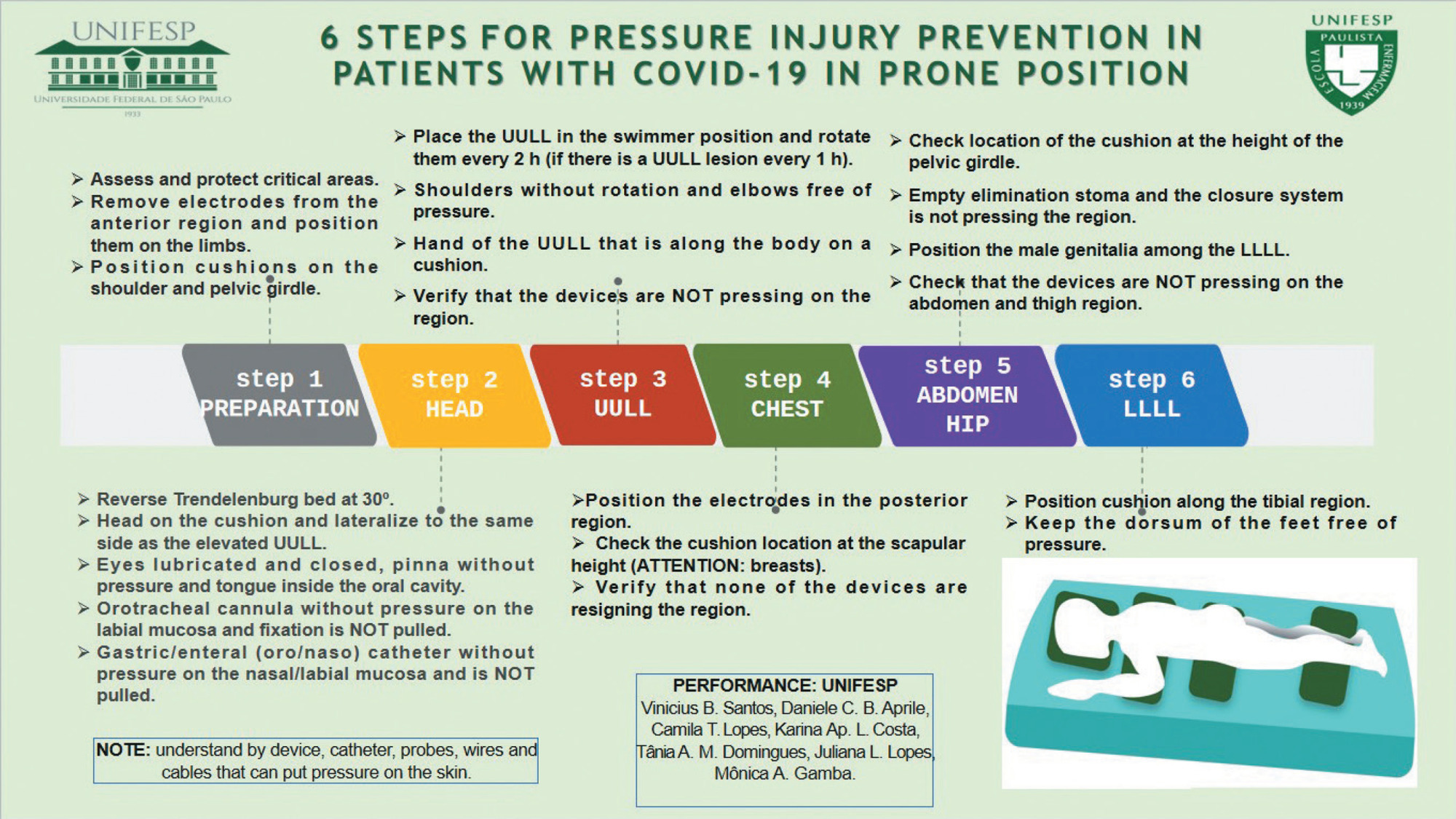
-
REVIEW03-09-2020
Singular therapeutic project in mental health: an integrative review
Revista Brasileira de Enfermagem. 2020;73(2):e20180508
Abstract
REVIEWSingular therapeutic project in mental health: an integrative review
Revista Brasileira de Enfermagem. 2020;73(2):e20180508
DOI 10.1590/0034-7167-2018-0508
Views0See moreABSTRACT
Objectives:
to analyze the Singular Therapeutic Projects’ characteristics in mental health care used to assist the subject with psychological distress.
Methods:
it is an Integrative Literature Review study conducted in July 2017. The following databases used to collect the data were LILACS, MEDLINE and BDENF. After applying the inclusion and exclusion criteria, 12 articles were selected.
Results:
there was divergence between what was recommended by the Ministry of Health for PTS elaboration with that described in the studies analyzed. Emphasis is placed on the low participation and co-responsibility between team/user in PTS elaboration, excessive referrals to specialized mental health services, fragmentation of knowledge within the multidisciplinary team, and difficulty sharing and discussing information about cases.
Final considerations:
it is pointed out the need to adapt PTS elaboration, and its respective steps, to the needs of each individual.
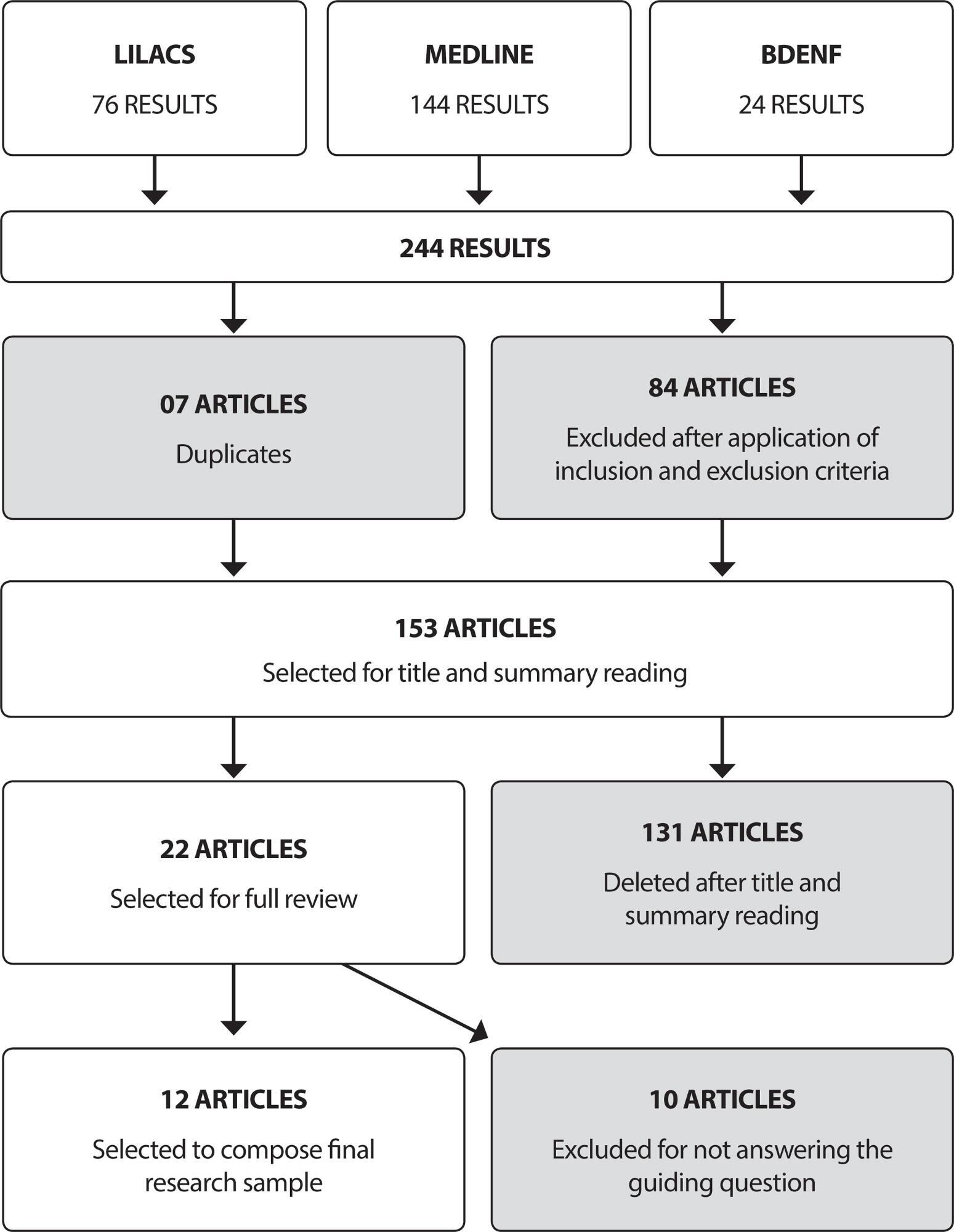
-
ORIGINAL ARTICLE12-13-2019
Obstetric Nursing in best practices of labor and delivery care
Revista Brasileira de Enfermagem. 2019;72:235-242
Abstract
ORIGINAL ARTICLEObstetric Nursing in best practices of labor and delivery care
Revista Brasileira de Enfermagem. 2019;72:235-242
DOI 10.1590/0034-7167-2018-0561
Views0See moreABSTRACT
Objective:
to evaluate the association of Obstetric Nursing in the best practices of delivery and birth care in maternity hospitals.
Method:
a cross-sectional study, with 666 women selected for delivery. Parturition obstetric practices performed by professionals were categorized into: clearly useful practices that should be encouraged, practices that are clearly harmful or ineffective and that should be eliminated and practices used inappropriately at the time of parturition.
Results:
clearly useful practices were used in greater proportions in the hospitals that had Obstetric Nursing working, while clearly harmful practices and those used inappropriately were practiced in smaller proportions in hospitals that had Obstetric Nursing, both with statistical difference.
Conclusion:
institutions with Obstetric Nursing adopt better practices of delivery and birth care, based on scientific evidence, when compared to those that do not act.
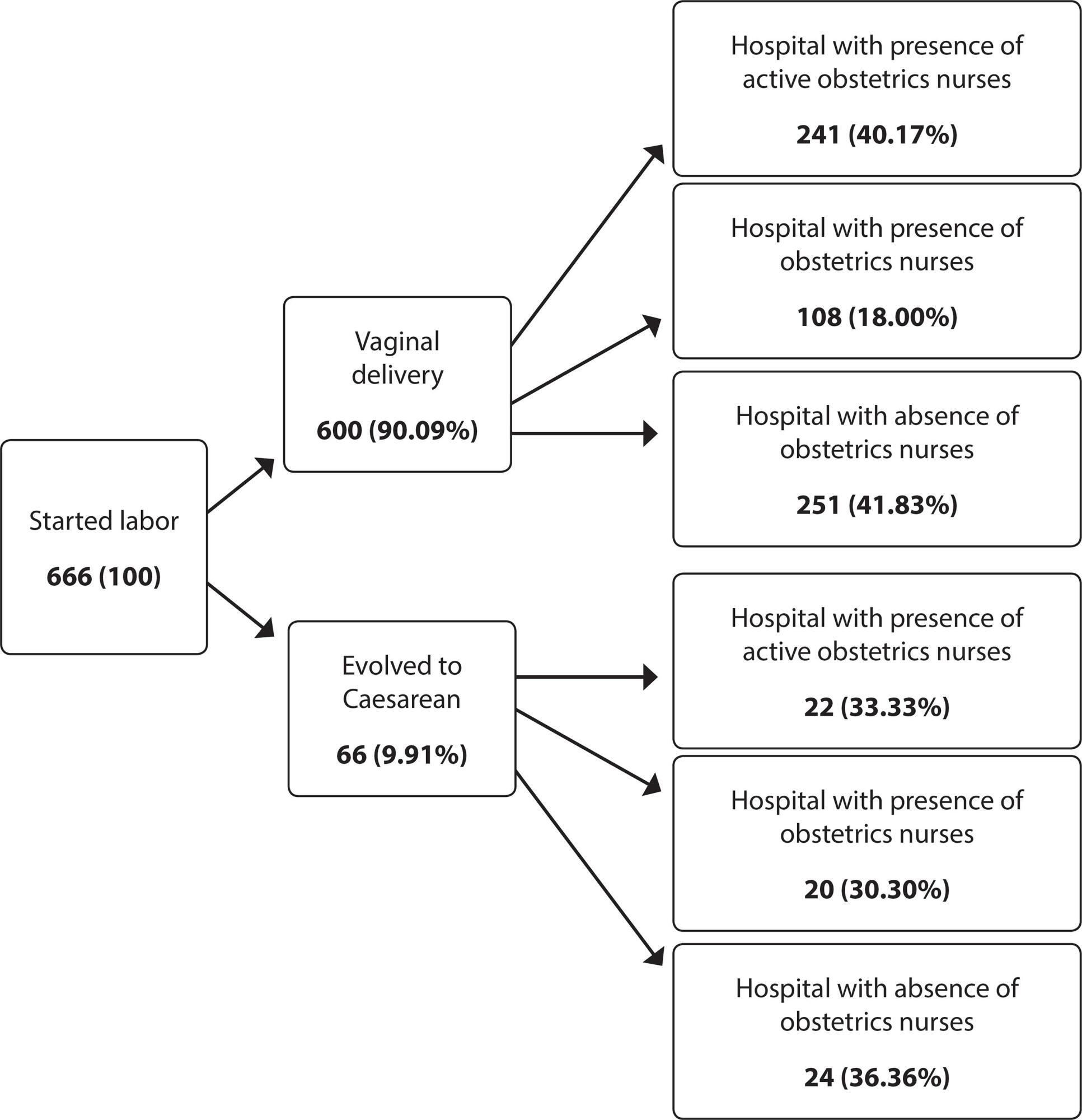
-
REVIEW08-20-2021
Assessment of patient safety culture in Brazilian hospitals through HSOPSC: a scoping review
Revista Brasileira de Enfermagem. 2021;74(6):e20201315
Abstract
REVIEWAssessment of patient safety culture in Brazilian hospitals through HSOPSC: a scoping review
Revista Brasileira de Enfermagem. 2021;74(6):e20201315
DOI 10.1590/0034-7167-2020-1315
Views0See moreABSTRACT
Objectives:
to describe, from literature, the characteristics of patient safety culture in Brazilian hospitals that applied the Hospital Survey on Patient Safety Culture.
Methods:
this is a scoping review. A search was performed in the databases LILACS, PubMed, SciELO, CINAHL, Web of Science, Scopus and in the CAPES Dissertations and Theses Database in September and October 2020.
Results:
thirty-six studies were identified. Nine studies identified strengthened areas such as: “teamwork within the units”, “expectations of supervisor/boss and actions promoting safety”, “organizational learning”, “support of hospital management for patient safety” and “frequency of report of events”. As a critical area, the dimension “non-punitive response to error” was evidenced in 30 of 36 studies.
Conclusions:
the identification of areas of strength and critical areas of safety culture is relevant to encourage improvement of patient safety problems in an institution.
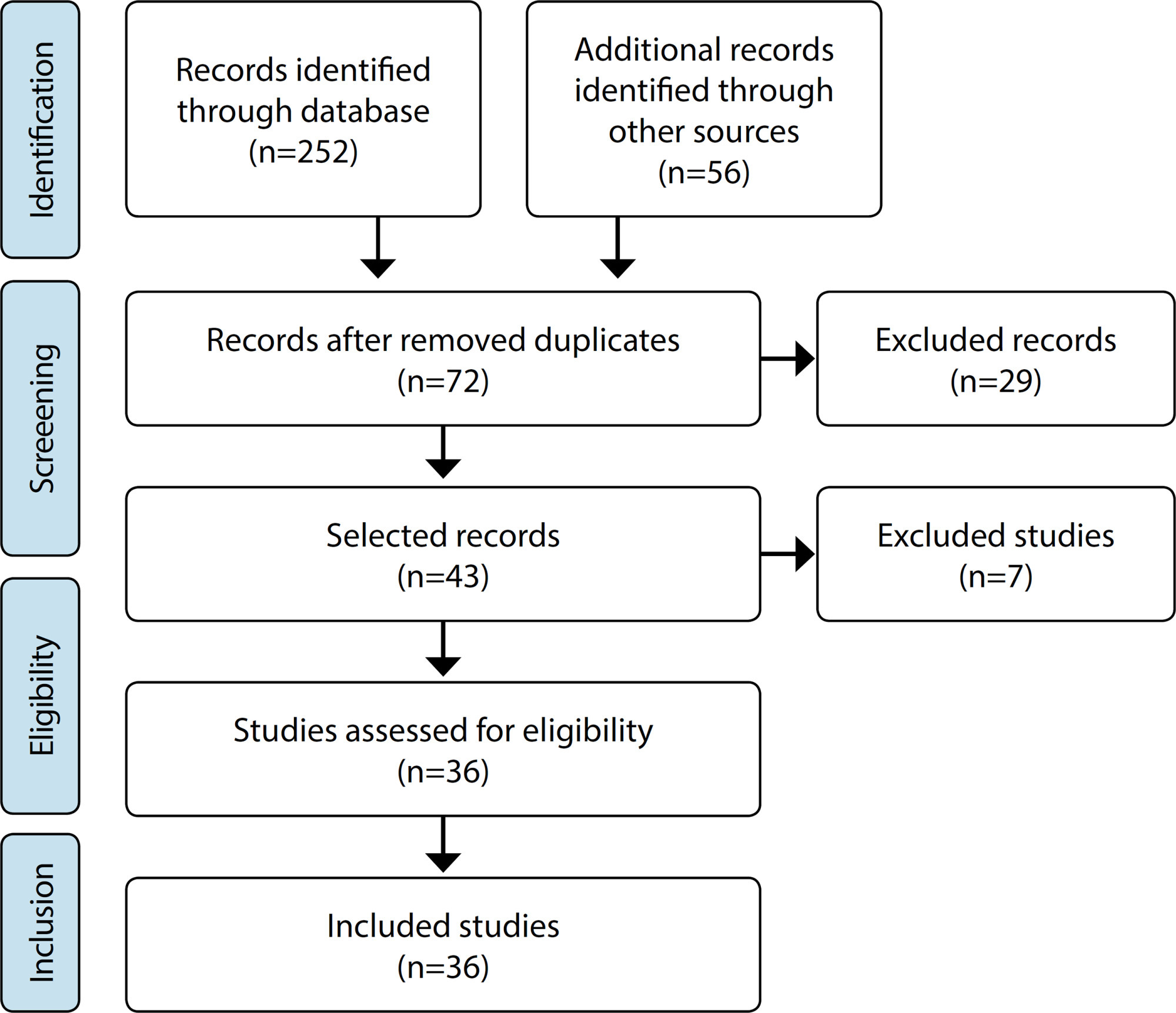
-
ORIGINAL ARTICLE07-31-2020
Maternal and child health care: adequacy index in public health services
Revista Brasileira de Enfermagem. 2020;73:e20170757
Abstract
ORIGINAL ARTICLEMaternal and child health care: adequacy index in public health services
Revista Brasileira de Enfermagem. 2020;73:e20170757
DOI 10.1590/0034-7167-2017-0757
Views0See moreABSTRACT
Objectives:
to analyze the adequacy of maternal and child-care in prenatal care, childbirth and the puerperal period, in the public health service.
Methods:
longitudinal study carried out in a city in Paraná with 357 puerperal women in a public maternity ward, outpatient clinic for immediate puerperal return and home visit 42 days postpartum. Four care domains were grouped (1 – Prenatal, 2 – Maternity, 3 – Immediate puerperal return, 4 – Late puerperal return). Mean, median, standard deviation and coefficient of variance were calculated considering adequate assistance when ≥ 70%; and inadequate, inferior.
Results:
lowest suitability average in Domain 3 (39.37%) and highest for Domain 4 (74.82%); median of 50.00% at 3 and 76.90% at 4. The largest standard deviation, in Domain 3 (25.18%); and high coefficient of variance for 1 and 3.
Conclusions:
in maternal and child follow-up, rates close to adequate in maternity care and higher in late puerperal return, meanwhile prenatal and immediate puerperal return were below the recommended in the health care network.
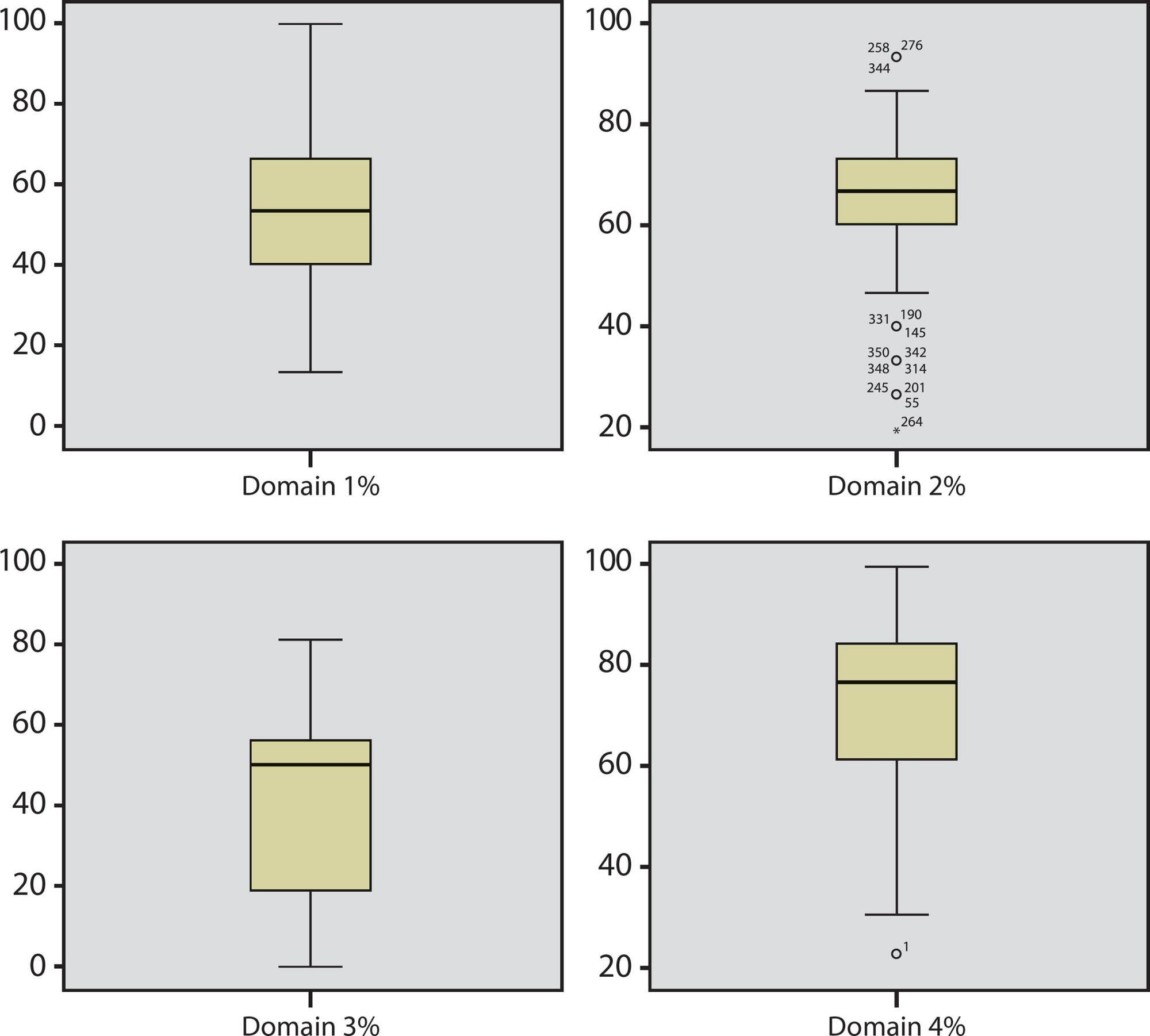
Search
Search in:
Nuvem de Tags
Adolescente (85) Atenção Primária à Saúde (239) COVID-19 (91) Criança (91) Cuidados de Enfermagem (269) Educação em Enfermagem (151) Educação em Saúde (139) Enfermagem (930) Enfermagem Pediátrica (86) Estudantes de Enfermagem (77) Estudos de Validação (131) Família (87) Idoso (208) Promoção da Saúde (99) Qualidade de Vida (104) Saúde do Trabalhador (86) Saúde Mental (145) Saúde Pública (82) Segurança do Paciente (150) Tecnologia Educacional (100)



